Library
All resources
1081 – 1100 of 2423 results

Cash and Voucher Assistance and Risk in Financial Management and Compliance
Report
The CALP Network commissioned a scoping study on CVA and risk in financial management and compliance, which considered three specific challenges facing humanitarian organisations related to AML/ CTF regulations:
1. Transferring funds to the country of operations – challenges in identifying competent and...

Risks learning event recommendations – Dakar
Report
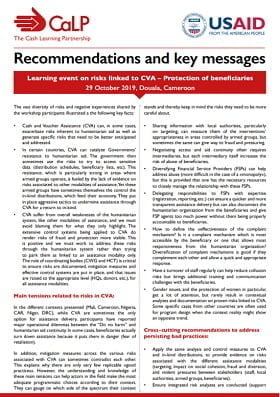
Risks learning event recommendations – Douala
Report

Piecing Together the Poverty Puzzle
Report
Five years ago, the World Bank Group set two overarching goals: to end extreme poverty by 2030, and to promote shared prosperity by boosting the incomes of the bottom 40 percent of the population in each country.
As this year’s Poverty and Shared Prosperity report documents, the world continues to make...

Compte-rendu du Cash Working Group du Niger du 04 décembre 2019
Report

CVA and Risks: What happens in the field, stays in the field?
Blog Post
In October 2019 in Douala, Cameroon, the CALP Network facilitated a learning event exploring the risks to beneficiary protection in Cash and Voucher Assistance (CVA). This closed-door workshop, held as part of series of meetings and webinars on theme of CVA and risk in different regions, convened 25...

Burundi Case Study: How can we reduce GBV risks in cash and voucher assistance?
Guidelines and Tools
Cash and voucher assistance (CVA) has become a valuable and increasingly utilized tool in humanitarian response in Burundi. CVA has been shown to contribute to the resilience of vulnerable populations, but in order to maximize its effectiveness, humanitarian actors should establish Gender Based Violence...

The Future of Financial Assistance: Why we wrote it, and where next
Blog Post
The world is changing rapidly. The way we deliver assistance is not. The CALP Network and IARAN’s new report on the Future of Financial Assistance makes clear that (i) significant change is urgently needed – new partners, new tools, new modes of collaboration, (ii) change must be drive by what’s...
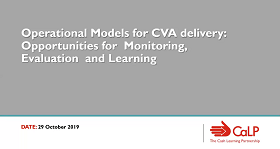
Monitoring, Evaluation and Learning: how to ensure efficiency, effectiveness and accountability
Blog Post
What are the key issues these and other emerging models are facing as they design to deliver better for people in crisis? What are the opportunities and challenges presented by working together differently?
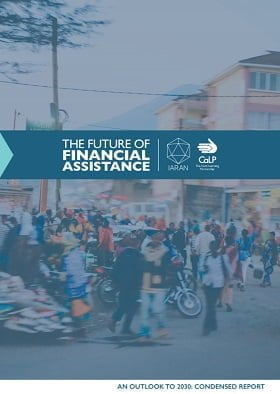
The Future of Financial Assistance – Condensed version
Report
The growing use of cash to meet humanitarian needs is challenging traditional sector and mandate based models, and bringing with it opportunities to work with new partners and tools. With its links to other reforms in humanitarian assistance, such as the push for localisation, participatory approaches,...

Future of Financial Assistance Infographics
Presentation
Key drivers of change
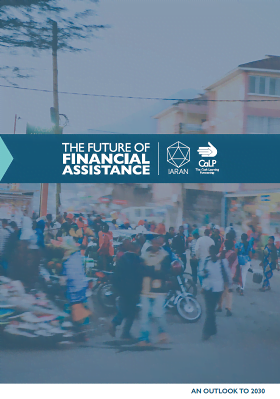
The Future of Financial Assistance: An outlook to 2030
Report
This major publication developed by the CALP Network and IARAN draws on extensive research with a broad range of stakeholders from across the humanitarian sector and beyond, and innovative foresight analysis. The report maps out potential scenarios for how financial assistance might look in 2030, the key...
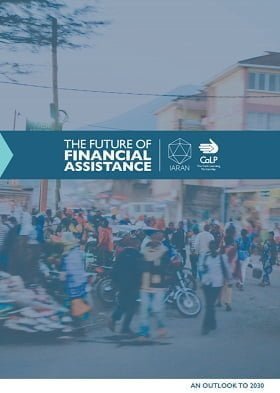
The Future of Financial Assistance – Executive summary
Report
The growing use of cash to meet humanitarian needs is challenging traditional sector and mandate based models, and bringing with it opportunities to work with new partners and tools. With its links to other reforms in humanitarian assistance, such as the push for localisation, participatory approaches,...

Consent and Ownership in the Shift to Digital Cash and Voucher Assistance
Blog Post
Part of committing to cash and voucher assistance (CVA) is committing to going digital and collecting data. While they are two different things, they are deeply intertwined. And while an organisation can ‘go digital’ without cash programmes, it’s nearly impossible to commit to cash programmes in the...
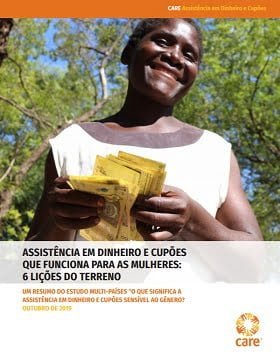
Assistência em Dinheiro e Cupões que Funciona para as Mulheres: 6 lições do terreno
Report
A Assistência em Dinheiro e Cupões (CVA) é actualmente uma ferramenta comum na acção humanitária que é utilizada para fazer face, com maior dignidade, às diversas necessidades de pessoas refugiadas por motivo de crises e conflitos. Embora existam cada vez mais evidências do efeito da CVA no...

Cash and Voucher Assistance that Works for Women: 6 lessons from the field
Report
Building on CARE’s commitment to be ‘cash ready’ to achieve breakthroughs with and for women and girl, CARE commissioned a study –in Malawi, Haiti, Jordan, the Philippines and Niger–on gender-sensitive CVA that allowed actual CVA recipients to frame the discussion. This is a brief from the...

Harmonising Data Systems for Cash Transfer Programming: Three key steps for Somalia
Blog Post
Cash and voucher assistance (CVA) is gaining traction as a transformative tool for addressing humanitarian needs in Somalia, with people living in crisis reporting that transfers of this kind helped to build resilience and diversify livelihoods. Delivery, however, is plagued by data challenges around the...

Linking Social Protection and Humanitarian Response – Best Practice
Report
This review looks at the alignment of humanitarian response in refugee crises with national social protection systems. It examines the experience of three countries dealing with protracted refugee situations: Turkey, Lebanon and Cameroon, and also identifies lessons from other literature. The number of...
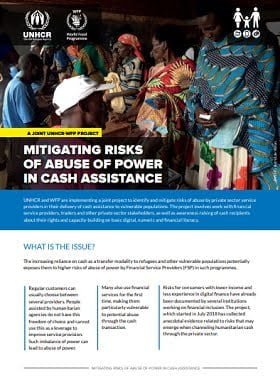
Mitigating Risks of Abuse of Power in Cash Assistance – 4 pages
Report
UNHCR and WFP are implementing a joint project to identify and mitigate risks of abuse by private sector service providers in their delivery of cash assistance to vulnerable populations. The project involves work with financial service providers, traders and other private sector stakeholders, as well as...

Nigeria Capacity Gap Analysis
Case Study
Between 2009 and 2019, the Boko Haram insurgency has affected around 13.4 million people in North East of Nigeria. Out the total affected, around 7.1 million are in need of humanitarian assistance while 6.2 million are targeted for humanitarian assistance. To date, 1.8 million people are reported...